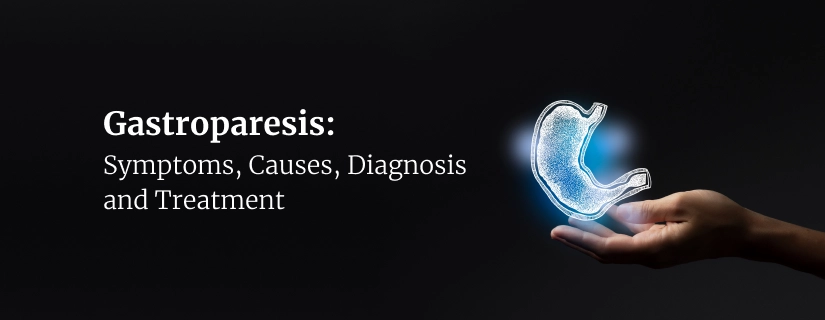Health Blog
Gastroparesis: Symptoms, Causes, Diagnosis, and Treatment
Learn about the key factors affecting gastroparesis and how to manage this condition effectively.

What is Gastroparesis?
Gastroparesis, also known as gastric paralysis, is a medical condition characterised by partial paralysis of the stomach muscles, which hampers the proper movement of food through the digestive system. Usually, the stomach contracts to grind food and push it into the small intestine for further digestion. However, these contractions are weakened or absent in individuals with gastroparesis, leading to a slowdown in the stomach's emptying.
Symptoms
Common symptoms include:
- Nausea and vomiting: Experiencing nausea and recurrent vomiting are common symptoms of gastroparesis. These symptoms occur due to the delayed emptying of food from the stomach. Bloating and abdominal discomfort: Gastroparesis can cause a feeling of fullness and bloating even after consuming small amounts of food.
- Feeling full after eating only a small amount
- Heartburn and acid reflux: The delayed stomach emptying in gastroparesis can lead to the regurgitation of stomach acid, causing heartburn and acid reflux.
- Lack of appetite and unintentional weight loss: You may experience a decreased appetite and unintended weight loss because of the discomfort and symptoms associated with gastroparesis.
- Fluctuating blood sugar levels: For individuals with diabetic gastroparesis, delayed stomach emptying can make it challenging to manage blood sugar levels.
Causes
Possible causes include:
- Diabetes: As mentioned earlier, diabetes is a common reason of gastroparesis. High blood sugar levels can damage the vagus nerve, affecting the stomach's ability to contract properly.
- Post-surgical complications: Certain abdominal surgeries, such as those involving the stomach or intestines, can lead to gastroparesis as a result of nerve damage.
- Medications: Some medications, such as opioids and certain antidepressants, can interfere with regular stomach contractions and contribute to gastroparesis.
- Neurological conditions: Disorders like Parkinson's disease and multiple sclerosis can negatively affect the nerves that control stomach muscles, leading to gastroparesis.
- Infection: Gastroparesis can develop due to an infection, such as viral or bacterial infection like Lyme disease.
Diagnosis
If you're experiencing gastroparesis symptoms, consulting a doctor for an accurate diagnosis is essential. Your doctor may perform several tests, including:
- Gastric emptying study: This test involves consuming a meal containing a small amount of radioactive material. The doctor will then monitor the movement of this material through your digestive system using a special camera.
- Upper endoscopy: A doctor will guide an endoscope (a flexible tube with a camera and light) through your mouth to examine the lining of your oesophagus, stomach, and small intestine. This procedure helps rule out other possible causes of your symptoms.
- Electrogastrography (EGG): This test measures the electrical activity of your stomach muscles to determine if they are functioning correctly.
Treatment
Treatment options include:
- Dietary modifications: Adjusting your diet to include smaller, more frequent meals that are low in fibre and fat can help ease gastroparesis symptoms.
- Medications: Certain medications, such as pro-kinetic agents, can help stimulate stomach contractions and improve stomach emptying.
- Feeding tube: In severe cases, when oral intake is insufficient, a feeding tube may be necessary to ensure adequate nutrition.
- Surgery: In some cases, doctors may suggest surgery to implant a gastric electrical stimulator, which helps regulate stomach contractions.
Conclusion
Consult your healthcare provider if you experience symptoms of gastroparesis for proper diagnosis and management.